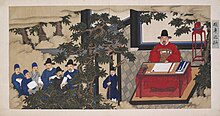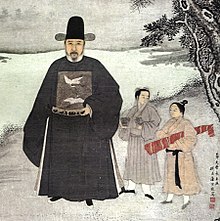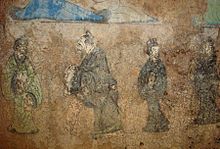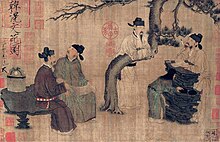| This article needs additional citations for verification. Please help improve this article by adding citations to reliable sources. Unsourced material may be challenged and removed. Find sources: "Scholar-official" – news · newspapers · books · scholar · JSTOR (April 2020) (Learn how and when to remove this message) |
| Scholar-official | |||||||
|---|---|---|---|---|---|---|---|
 Painting that depicts the career of a civil servant. The career path starts with passing the civil service examinations (left side) and progresses to a high position in the government (right side). Painting that depicts the career of a civil servant. The career path starts with passing the civil service examinations (left side) and progresses to a high position in the government (right side). | |||||||
| Chinese name | |||||||
| Traditional Chinese | 士大夫 | ||||||
| |||||||
| Vietnamese name | |||||||
| Vietnamese alphabet | Sĩ đại phu | ||||||
| Chữ Hán | 士大夫 | ||||||
| Korean name | |||||||
| Hangul | 사대부 | ||||||
| Hanja | 士大夫 | ||||||
| |||||||
| Japanese name | |||||||
| Kanji | 士大夫 | ||||||
| Hiragana | したいふ | ||||||
| |||||||

The scholar-officials, also known as literati, scholar-gentlemen or scholar-bureaucrats (Chinese: 士大夫; pinyin: shì dàfū), were government officials and prestigious scholars in Chinese society, forming a distinct social class.
Scholar-officials were politicians and government officials appointed by the emperor of China to perform day-to-day political duties from the Han dynasty to the end of the Qing dynasty in 1912, China's last imperial dynasty. After the Sui dynasty these officials mostly came from the scholar-gentry (紳士 shēnshì) who had earned academic degrees (such as xiucai, juren, or jinshi) by passing the imperial examinations. Scholar-officials were the elite class of imperial China. They were highly educated, especially in literature and the arts, including calligraphy and Confucian texts. They dominated the government administration and local life of China until the early 20th century.
Origins and formations

Origins of Shi (士) and Da fu (大夫)
See also: Chinese nobility § Pre-imperial aristocracyScholar-official as a concept and social class first appeared during the Warring States period; before that, the Shi and Da Fu were two different classes. During the Western Zhou dynasty, the Duke of Zhou divided the social classes into the king, feudal lords, Da Fu, Shi, ordinary people, and slaves. Da Fu were people from the aristocracy who served as officers and were a higher class than Shi, who were people from the social class between Da Fu and ordinary people and could only serve as low-level officials.
During the Warring States period, with the annexation wars between states and the rise of bureaucracy, many talented individuals from the Shi class provided valuable services to their lords. Shi became more influential and Da Fu gradually evolved into an official position in the bureaucracy, not a hereditary peerage. The Shi and Da Fu gradually merged and became the Scholar-officials (士大夫 Shi Da Fu).
Ancient social classes
The feudal social structure came to divide ordinary people into four categories, with scholar-officials at its top level, this structure is another important institutional basis of the formation and prosperity of scholar-officials. The order of these Four Occupations were scholar-officials, farmers, artisans, and craftsmen/merchants.

Interaction with Confucianism
Further information: Junzi and Four artsConfucianism is the core of traditional Chinese culture and the theoretical basis of the autocratic feudal monarchy. The Confucian school of thought became the mainstream of traditional Chinese society, and Confucian education also became the mainstay of selecting officials at most levels of administration.
Despite the hierarchical tendencies of Confucianism, scholar-officials and ministers are not mere obedient subordinates of the ruler, but theoretically have equal roles in the maintenance of social order. This includes the possibility of running counter against or opposing the ruler, should he prove to be unfit to uphold righteous principles and fail to provide and promote well-being for the people. Thus, the balance of power is ideally split between the meritocratic Confucian scholars and the dynastic emperors, and a ruler should maintain power with the acceptance of their ministers, who have the ultimate right to sanction and forcibly depose a tyrannical or failing ruler.
During the Song and Ming dynasties, Confucian philosophers combined Taoist and Buddhist thought to produce the Neo-Confucian school, further enriching the Confucian ideological system. This directly increased the prosperity of the scholar-official class and also contributed to the unique moral code of the scholar-officials, which had a huge impact on the Chinese literati of later generations.
Talent selection systems in Ancient China
The traditional Chinese official selection systems are the institutional basis of the formation of scholar-officials.
Developments
Han to Northern and Southern dynasties (202 BC—589 AD)

Using the Recommendatory System and Nine-rank System to select governments officials and candidates were popular during the long period beginning with the Han dynasty and ending after the Northern and Southern dynasties period. Scholars-officials during this period usually from prominent clans, including the Zheng clan of Xingyang, Xie clan of Chen Commandery, Cui clan of Qinghe, Cui clan of Boling, Wang clan of Langya, Wang clan of Taiyuan, and the Lu clan of Fanyang. These clans were prominent in having Confucian scholars and high-ranking government officials, with male family members serving as official for generations and some clans or families serving several chancellors. They formed a huge network through political marriages with each other or the imperial family and also formed a monopoly on education and government officials.
Sui and Tang Dynasties (581—907)

Officially established in 587, the Civil Service Examination allowed for selection of scholar-officials. Beginning with the Sui dynasty, those with the right family background who passed this examination would become scholar-officials. In the early part of the Tang dynasty, empress Wu Zetian reformed and improved the Imperial Examination system by establishing the Metropolitan Exam; people who passed it were called Jinshi (metropolitan graduates, highest degree), and people passed the Provincial Exam were called Juren (provincial graduates). Wu's reforms gradually led to today's concept of scholar-officials and the intellectual class. The government would select scholar-officials by examining their poems and essays writings for knowledge of Confucian texts and some Buddhist texts. Intellectuals who passed the exam served as officials. Many famous Tang poets were scholar-officials, such as Du Mu. However, because the Tang Dynasty was a rapidly changing period for the final formation of the structure and composition of scholar-officials, there is some ambiguity of the usage of the words "scholar-officials": according to the Old Book of Tang, scholars/intellectuals who passed the imperial exam but took no official position could only be referred to Shi 士; according to the New Book of Tang, as long as they were scholars, whether official or not, they could be called scholar-officials.
Song Dynasty (960-1279)

The Song dynasty was the golden age for scholar-officials. By this time, passing the Imperial Examination had become the major path for people to hold an official position in the government. With the continuous improvements and reforms of Imperial Examination, the bureaucracy completely replaced the aristocracy, and the scholar-officer's polity was completely established. Song was the only dynasty in Chinese history that provided scholar-officials judicial privilege. Due to the influence of the founding emperor of Song Zhao Kuangyin, almost all Song emperors showed great respect to intellectuals. If a scholar-official from the Song dynasty committed a crime, he couldn't be held accountable directly. Instead, an internal impeachment replaced the formal judicial process. If his crime wasn't serious, he only needed to be punished with a reprimand instead of a criminal penalty.
Yuan, Ming, and Qing Dynasties (1271—1912)


During the Yuan, Ming and Qing dynasties, the stereotyped writing style of the eight-legged essay (八股文) format dominated the Imperial Examination, and scholar-officials from this period were relatively unable to speak and create freely due to the harsh political environment. The strong relationship between Imperial Examination and the official position were still present, though the entire society formed a climate of "studying well so as to become an official" 学而优则仕.
In 1905, the Qing government abolished the imperial examination system, leading to the gradual disappearance of scholar-officials.
Non-governmental functions
Since only a select few could become court or local officials, the majority of the scholar-literati stayed in villages or cities as social leaders. The scholar-gentry carried out social welfare measures, taught in private schools, helped negotiate minor legal disputes, supervised community projects, maintained local law and order, conducted Confucian ceremonies, assisted in the government's collection of taxes, and preached Confucian moral teachings. As a class, these scholars claimed to represent morality and virtue. The district magistrate, who by regulation was not allowed to serve in his home district, depended on the local gentry for advice and for carrying out projects, which gave them the power to benefit themselves and their clients.
Evaluations
Further information: Imperial examinationsTheoretically, this system would create a meritocratic ruling class, with the best students running the country. The imperial examinations gave many people the opportunity to pursue political power and honor and thus encouraged serious pursuit of formal education. Since the system did not formally discriminate based on social status, it provided an avenue for upward social mobility. However, even though the examination-based bureaucracy's heavy emphasis on Confucian literature ensured that the most eloquent writers and erudite scholars achieved high positions, the system lacked formal safeguards against political corruption, only the Confucian moral teachings tested by the examinations. Once their political futures were secured by success in the examinations, officials were tempted by corruption and abuse of power.
The Princeton scholar Benjamin Elman writes that some criticized the examination elite as hindering China's development over the last century but that preparing for the examinations trained government officials in a common culture and that "classical examinations were an effective cultural, social, political, and educational construction that met the needs of the dynastic bureaucracy while simultaneously supporting late imperial social structure."
With the development of international influence of Civil Service Examination system in ancient East Asia region, Scholar-officials also became an important social backbone of ancient Korea (include Goguryeo, Silla, and Baekje), Ryukyu Kingdom, and Vietnam.
See also
- Bildungsbürgertum
- Cabang Atas, the Chinese gentry of colonial Indonesia
- County magistrate, the official in charge of the county
- Four arts
- Junzi
- Kuge
- Landed gentry in China
- Mandarin (bureaucrat)
- Yangban, the Korean form of the scholar-official
Notes
- Li, Su (2018-12-31), Yongle, Zhang; Bell, Daniel A (eds.), "CHAPTER 3. Scholar-Officials", The Constitution of Ancient China, Princeton: Princeton University Press, pp. 98–138, doi:10.23943/9781400889778-006, ISBN 978-1-4008-8977-8, S2CID 186384234, retrieved 2020-12-04
- DiCICCO, JOEL M. (2003). "The Development of Leaders in Ancient China, Rome, and Persia". Public Administration Quarterly. 27 (1/2): 6–40. doi:10.1177/073491490302700102. ISSN 0734-9149. JSTOR 41288186.
- Yü, Ying-shih (2021). "Confucian Culture vs. Dynastic Power in Chinese History". Asia Major. 34 (1–2).
- Gardner, Daniel K. (26 June 2014). Confucianism: A Very Short Introduction. Oxford University Press. pp. 33–44, 54–58, 98–100. ISBN 9780190236809.
- "120". Book of Later Han.
进贤冠,古缁布冠也,文儒者之服也。前高七寸,后高三寸,长八寸。公侯三梁,中二千石以下至博士两梁,自博士以下至小史私学弟子,皆一梁。宗室刘氏亦两梁冠,示加服也。
- Wang, Yongping (2010-01-01). "Rupture and Continuity: Scholar-Official Clan Culture in the Six Dynasties and the Legacy of Chinese Civilization". Frontiers of History in China. 5 (4): 549–575. doi:10.1007/s11462-010-0111-y. ISSN 1673-3401. S2CID 162213370.
- Holcombe, Charles (2019). "Eastern Jin". In Dien, Albert E; Knapp, Keith N (eds.). The Cambridge History of China. pp. 96–118. doi:10.1017/9781139107334. ISBN 978-1-139-10733-4.
- Wang, Rui (2012). The Chinese Imperial Examination System: An Annotated Bibliography. Scarecrow Press. ISBN 978-0-8108-8703-9.
- Wang, Rui (2012-11-08). The Chinese Imperial Examination System: An Annotated Bibliography. Scarecrow Press. ISBN 978-0-8108-8703-9.
- "The Evolution of the Officials Selection System and Literary Creation--"Journal of Peking University(Philosophy and Social Sciences)" 2017年06期". en.cnki.com.cn. Retrieved 2020-12-18.
- Sokolova, Anna (2020). "Mid-Tang Scholar-Officials as Local Patrons of Buddhist Monasteries". Zeitschrift der Deutschen Morgenländischen Gesellschaft. 170 (2): 467–490. doi:10.13173/zeitdeutmorggese.170.2.0467. ISSN 0341-0137. JSTOR 10.13173/zeitdeutmorggese.170.2.0467. S2CID 226765849.
- "唐代"士大夫"的特色及其变化". www.1xuezhe.exuezhe.com. Retrieved 2020-12-18.
- "Combination of scholars and bureaucracy: the establishment of the scholar-officer's civilian polity in the Song Dynasty--Journal of Anhui Normal University(Philosophy & Social Sciences2005年05期". en.cnki.com.cn. Retrieved 2020-12-18.
- Wang, Rui (2012). The Chinese Imperial Examination System: An Annotated Bibliography. Scarecrow Press. ISBN 978-0-8108-8703-9.
- Wu, Chin-shan (2008). Subordinates and evildoers: Song scholar-officials' perceptions of clerks (Thesis). OCLC 312130272. ProQuest 304329586.
- Wang, Rui (2012). The Chinese Imperial Examination System: An Annotated Bibliography. Scarecrow Press. ISBN 978-0-8108-8703-9.
- "The Evolution of the Officials Selection System and Literary Creation--Journal of Peking University (Philosophy and Social Sciences)2017年06期". en.cnki.com.cn. Retrieved 2020-12-18.
- "Remonstrance: The Moral Imperative of the Chinese Scholar-Official". Association for Asian Studies. Retrieved 2020-10-09.
- Elman (2009), p. 405.
Sources
- Elman, Benjamin A. (2009), "Civil Service Examinations (Keju)" (PDF), Berkshire Encyclopedia of China, Great Barrington, MA: Berkshire, pp. 405–410
- Yongle, Zhang, and Daniel A. Bell, editors. "Scholar-Officials." The Constitution of Ancient China, by Su Li and Edmund Ryden, Princeton University Press, PRINCETON; OXFORD, 2018, pp. 98–138. JSTOR
- Liu, Bo. "The Multivalent Imagery of the Ox in Song Painting." Journal of Song-Yuan Studies, vol. 44, 2014, pp. 33–84. JSTOR
- "Scholar-Officials: Struggling for the Right Position." Thriving in Crisis: Buddhism and Political Disruption in China, 1522–1620, by Dewei Zhang, Columbia University Press, New York, 2020, pp. 119–155. JSTOR
- Wang, Rui. Wu Zetian's Contribution to the Cultural Development of the Tang Dynasty. ProQuest, 2008.
Further reading
- Esherick, Joseph and Mary Backus Rankin (1990). Chinese Local Elites and Patterns of Dominance. Berkeley: University of California Press. ISBN 0520067630.. Free online text.
- Max Weber, The Religion of China: Confucianism and Taoism (1916; transl. 1951)
- Jerry Bentley and Herb Ziegler. Traditions and Encounters - A Global Perspective on the Past.
- Zhang, Zhongli (1955). The Chinese Gentry; Studies on Their Role in Nineteenth-Century Chinese Society. Seattle: University of Washington Press.
External links
- Late Qing China: Reform and Rebellion (1898 -1900)
- Reunification and Renaissance in Chinese Civilization: The Era of the Tang and Song Dynasties
- The Chinese Scholar-Official Education About Asia, Columbia University.
| Government of Imperial China | |||||
|---|---|---|---|---|---|
| Nobility | |||||
| Offices | |||||
| Institutions | |||||
| Early Imperial | |||||
| Middle Imperial |
| ||||
| Late Imperial |
| ||||
| Imperial guards | |||||
| Dynasties | |||||
- Li, Su; Ryden, Edmund (2018). The Constitution of Ancient China. Princeton University Press. ISBN 978-0-691-17159-3. JSTOR j.ctt20fw8c6.
- Liu, Bo (2014). "The Multivalent Imagery of the Ox in Song Painting". Journal of Song-Yuan Studies. 44: 33–84. ISSN 1059-3152. JSTOR 44511239.
- Zhang, Dewei (2020). Thriving in Crisis: Buddhism and Political Disruption in China, 1522–1620. Columbia University Press. doi:10.7312/zhan19700. ISBN 978-0-231-19700-7. JSTOR 10.7312/zhan19700. S2CID 227777467.